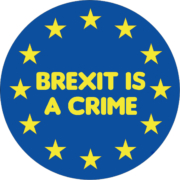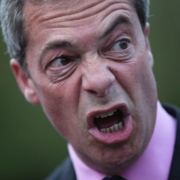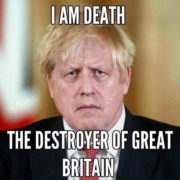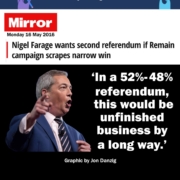Back in March before Lockdown started, I set up a Parliamentary petition calling for an independent Public Inquiry into the 2016 referendum with the dishonesty and unlawful activity of the Leave Campaign in mind.
I did so not in the hope that the current government would agree to hold one. That is never going to happen given that Johnson and the current leadership of the Tory party were up to their necks in the wrongdoings of the Leave Campaign.
I did so to highlight the fact that we, the remain movement are still here, and that we haven’t gone away. I also had it in mind that maybe, just maybe, if we could force a Government response, they might give us a stick to beat them with.
That response arrived last week and is displayed below, and yes, they did give us a stick to beat them with. The misleading and dishonest nature of the response is quite something.
I have therefore written to the chair of the Petitions Committee, Catherine McKinnell MP expressing my disappointment with the Government response.
I have also written to the Prime Minister, taking apart the Government response line by line, which I have posted below the response to the petition.
The government response to our petition calling for an investigation into the EU Referendum already:
“The legality of the EU referendum is beyond doubt, which is why there are no plans for an inquiry. The referendum result should be respected, which is why the UK has now left the European Union.
Almost three quarters of the electorate took part in the 2016 EU referendum, trusting that the result would be respected. 17.4 million people voted to leave the European Union, providing the biggest democratic mandate for any course of action ever directed at the UK Government.
The referendum was carried out in accordance with legislation passed by Parliament. The provisions relating to the conduct of the referendum were carefully scrutinised and ratified by Parliament, and there was a six week period in which the result of the EU referendum could be challenged by judicial review.
The Electoral Commission is the independent regulatory body responsible for ensuring that elections and referendums are run effectively and in accordance with the law. Fines were levied on multiple groups on both sides of the referendum campaign.
We treat the security and integrity of our democratic processes extremely seriously. That’s why the Government continues to strengthen and modernise the framework which governs electoral campaigning to make sure the rules work, now and in the future.
In the 2019 General Election, the British people cast their votes once again and elected, with a substantial majority, a Government committed to upholding the result of the referendum.
Following the Election, Parliament voted with clear majorities in both Houses for the
European Union (Withdrawal Agreement) Act 2020.
By honouring the result of the referendum and having now left the European Union on 31
January 2020, this Government has helped preserve confidence in the UK’s democracy.
For these reasons, the Government has no plans to hold a public inquiry into the 2016
referendum.
Cabinet Office”
My letter to Boris Johnson:
Dear Prime Minister
I write on behalf over the 23,000 plus people who have signed my petition calling for a public inquiry into the 2016 EU membership referendum and the 18,000 plus people who support my Campaign to Rejoin the EU.
Last week your Government responded to my petition as it had reached the 10,000 threshold for such a response. There are several aspects of that response that are not satisfactory that I wish to raise with you.
Firstly, your Government claims that the legality of the referendum is beyond doubt. As I am sure you are aware the outcome of the referendum was challenged in various court cases over the last few years. Whilst those challenges ultimately proved unsuccessful, it should however be noted that it was established in the Miller case that the referendum was ineffective in law. Furthermore, in the Wilson case, the Government’s own lawyer admitted that the Government knew the result of the referendum was tarnished.
The claim made in the response that the legality of the referendum is beyond doubt is therefore simply wrong.
In addition, it should also be noted that whilst the government treated the referendum as binding, part of the Government’s defence when challenged over the legality of their actions concerning the referendum in the Webster case, was that the referendum was advisory.
That is unacceptable. To treat the 2016 referendum as mandatory as the Government did but subsequently rely in court on a defence that it was advisory to avoid the result being annulled, as the government did, is frankly duplicitous.
Secondly, the response goes on to say that three quarters of the ‘electorate’ took part in the referendum trusting that the result would be respected. However, that ‘electorate’ was defined by the government in such a way that the approximately three million people who had most to lose in the event of a vote to leave EU were excluded from participating, including many of the British citizens living in other EU countries enjoying their rights of freedom of movement conferred upon them by our EU membership. The response makes no mention of this fact.
Furthermore, many people who took part in that referendum, did so on the basis that they could trust that all parties involved would conduct themselves fairly and honestly. In this later respect, the Leave campaign most definitely did not conduct themselves honestly. Indeed Professor Michael Dougan concluded that ‘The Leave Campaign degenerated into dishonesty on an industrial scale’ and ‘that on virtually every major issue that was raised in the referendum debate, Leave’s argument consisted of, at best, misrepresentations and at worst, outright lies.’
Having conducted my own analysis of the Leave Campaign, I have to say that I concur with Professor Dougan as I have concluded that the entire Leave Campaign narrative was and continues to be based upon deliberate and sustained falsehood.
Indeed nothing could represent this more than the unprecedented intervention by the Head of the UK statistics authority letter in the form of a letter written to yourself effectively pointing out your lies concerning the cost of our EU membership that were also emblazoned on the side of a bus during the campaign.
Such planned and sustained dishonesty is not acceptable and itself represents a gross breach of trust. For the issue of voter trust to be raised in the response is therefore rather ironic and hypocritical.
Thirdly the response states that 17.4 million people voted to leave the EU, providing the biggest democratic mandate in UK history. Those 17.4 million people represented just 37% of the restricted electorate for the referendum which is just 26% of the UK population.
That is not a majority by any stretch of the imagination.
Furthermore, given the dishonesty noted above, together with the unlawful activity of the Leave Campaign that I will address shortly, one must ask how many votes Leave would have received had they acted within the law and with honesty?
Sadly, we will never know the answer to that question, but I suspect it would have been a considerably lower figure.
Given this, the actions of the Government in pursuing our exit from the EU based upon the referendum result has in fact breached the trust that the electorate had in that referendum rather than upholding that trust.
Fourthly, the response goes on to state that parliament scrutinised the conduct of the referendum and that the result could be challenged in the form of a judicial review within six weeks of the referendum.
This parliamentary scrutiny occurred before the unlawful activity by the Leave Campaign came to light and was no doubt conducted under the ‘Party Whip’ system meaning the quality of that scrutiny is questionable. Furthermore, the illegal activity came to light after the six-week period within which the result could be challenged by judicial review, a point the government later relied upon in its defence to the legal challenge in the Wilson case, something that was acknowledged by the judges.
These claims made in the response do not therefore accurately represent the true situation and are at best misleading.
Fifthly, whilst it is true that both sides were fined by the Electoral Commission as claimed in the response, that does not make such unlawful activity acceptable or justified. Furthermore, the Leave Campaign was fined the maximum amount permissible for at least one offence, whereas the fines levied on the Remain Campaign were much lower, which is indicative of the unlawful acts committed by the Leave Campaign being much more serious than those committed by the Remain Campaign.
In addition to these fines, the Information Commissioners Office also levied multiple large fines on the Leave Campaign for breaching Data Protection Laws. These are not mentioned in the response and neither are the fines levied on other organisations such as Facebook that were connected to the conduct of various parts of the Leave Campaign such as Cambridge Analytica who stole data from Facebook.
So again, the response by the Government does not accurately reflect the true situation and, again, is at best, misleading.
Furthermore, there is still strong suspicion amongst the electorate at large that the Leave Campaign may have breached criminal Law, a situation exacerbated by recent claims made by Aron banks that the NCA agents investigating him had given him an easy ride as they were Brexiteers.
Again, this is not acceptable, and one must ask how many votes Leave would have received had they acted within the law?
Sixthly, the response goes on to state that the Government takes the security and integrity of our electoral system seriously. This claim simply does not stand up to scrutiny, given the failure of the Government to request that the security services investigate allegations of Russian interference in the 2016 referendum.
This failure is particularly concerning as various government figures and parliamentary bodies seem quite willing to admit that the Russians have interfered in various other of democratic exercises such as the Scottish Independence Referendum and the 2019 General Election. Frankly, given those admissions, it is very difficult to believe that the Russians would not have interfered in the one democratic exercise that they stood to benefit the most from, specifically the 2016 EU membership referendum.
Until this omission is corrected and the alleged Russian interference is in the referendum is fully investigated, the government claims made in the response about taking the security and integrity of our democratic processes very seriously are simply not credible.
Seventhly, the response claims that the British People cast their votes and elected a Government committed to upholding the result of the referendum. Whilst this statement is factually correct, it is only so because of our flawed electoral system. In December 2019, 53% of the British Electorate voted for parties committed to offering a further referendum on our EU membership.
The 2019 election result does therefore not provide a mandate for your Government to leave the EU and the response therefore yet again fails to reflect the true situation .
Taking us out of the EU, as you have done, is therefore not the act of a Prime Minister or Government committed to democracy. Additionally, when coupled with your part in the dishonesty of the Leave Campaign in 2016 and subsequently, means that act has no democratic legitimacy whatsoever.
Finally, in the concluding paragraph, the response claims that the Government has helped preserve confidence in the UK’s democracy. Given the above, this is patently not the case and is therefore yet another false claim.
If anything, the Government’s actions have seriously undermined democracy in our country, and indeed undermined the rule of law and the very existence of the United Kingdom given the way they have allowed dishonesty and unlawful activity to prevail. Still given your role in that Leave Campaign, that is hardly surprising.
Professor Dougan summed this issue up by stating ‘I’m afraid that Leave have inflicted quite untold damage on the quality of our democracy’. I have no reason to doubt his judgement on this issue.
In conclusion I therefore have to state that the response is neither satisfactory or acceptable.
In fact the response is seriously misleading and does not reflect the true situation in any way.
Your decision to remove this country form the EU has no legitimacy and never will.
What you have done is not acceptable, the behaviour of the Leave Campaign relating to the 2016 referendum, including your personal role in that will be investigated, and you will be held to account for your actions.
The Remain Movement is still here, is still active, and is not going away! We will retake our rightful place at the heart of the EU that you and the Leave Campaign have illegitimately deprived us of.
Yours Sincerely
Dr Adam Poole








